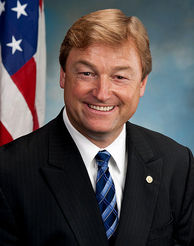Dean Heller Makes History in Nevada
Heller is the first Republican in Nevada to be elected to the U.S. Senate while the state votes for the Democratic presidential nominee since the introduction of popular vote elections

But Heller did so under unusual circumstances in the Silver State.
A Smart Politics review of Nevada election data finds that Dean Heller is the first Republican U.S. Senator to be elected when a Democratic presidential nominee carried the state at the top of the ticket since the state’s 1908 ballot measure in which residents first voted for candidates to the nation’s upper legislative chamber.
With just 45.9 percent of the vote, Heller ran only 0.2 points ahead of Romney, who lost the state by 6.6 points to President Obama.
But that was just enough support to save the seat for the GOP, with Berkley at 44.7 percent, Independent American candidate David Vanderbeek receiving 4.9 percent, and 4.5 percent of Nevadans opting for ‘none of the above.’
Prior to Tuesday, Nevada was one of 18 states that had never split their ticket for a Democratic presidential nominee and a Republican U.S. Senator since popular vote elections were introduced a century ago.
The other 17 states are: Alabama, Alaska, Arizona, Connecticut, Indiana, Louisiana, Michigan, Mississippi, Montana, North Carolina, South Carolina, Texas, Utah, Virginia, West Virginia, Wisconsin, and Wyoming.
Overall, Nevadans have voted for both the Democratic presidential and U.S. Senate nominees in eight cycles (1908, 1912, 1916, 1932, 1940, 1944, 1964, 1992), for both Republican nominees in four cycles (1920, 1952, 1980, 2000), and for the Republican presidential nominee and the Democratic U.S. Senate nominee in six cycles (1928, 1956, 1968, 1976, 1988, 2004).
The previous four Republican U.S. Senators from Nevada elected during a presidential election cycle were Tasker Oddie in 1920 (with Warren Harding at the top of the ticket), George Malone in 1952 (Dwight Eisenhower), Paul Laxalt in 1980 (Ronald Reagan), and John Ensign in 2000 (George W. Bush).
Oddie, Malone, and Laxalt all benefited from presidential coattails with Harding (+14.8 points), Eisenhower (+9.6 points), and Laxalt (+4.0 points) all running ahead of the senate nominees in the state.
Ensign ran 5.6 points ahead of Bush in the state in 2000.
In addition to Heller and Ensign, four other Republican senate nominees have run ahead of their party’s presidential nominee in the state: William Massey in 1912 (+23.4 points ahead of William Taft), Tasker Oddie in 1932 (+17.3 points ahead of Herbert Hoover), Paul Laxalt in 1964 (+8.6 points ahead of Barry Goldwater), and Demar Dahl in 1992 (+5.5 points ahead of George H.W. Bush).
Follow Smart Politics on Twitter.

I hope this puts an end to all the mythology about the fearsome “Harry Reid Turnout Machine”. You can ask his son Rory and returning Rep. Dina Titus (in a new district) how well it worked for them in 2010. Fact is, the Harry Reid Turnout Machine is the HARRY REID Turnout Machine. In 2010 all the campaign mail we received with return address “Nevada Democratic Party” was for Harry and Harry alone. No reference to statewide or legislative candidates, which is why so many of them did so poorly.
Congratulations, Dean, on six more years!
Howard Hirsch, MA, School of Public Affairs, U of M, 1976
chairman, 2007-08
Lyon County Republican Central Committee
Dayton, Nevada
I attribute it to several factors, but I think one of the primary reasons is Heller is a household name across the state since he was Secretary of State for many years. His opponent, Shelley Berkley was based out of Las Vegas and was known in her own congressional district.
Well, and the tell all, he has more facebook friends than she has, by nearly 20%. Maybe people just liked him better than Berkley, who many in the north part of the state did not even know.
And it’s not like Heller was waaayyy down ticket. After President, his office was the very next decision on the ballot. Berkley had some ethics issues that “stuck” and her charges against Heller on the CMKK Diamond affiliation did not stick. It was just too attenuated.
1. “…with Harding…and ‘Laxalt’ (+4.0 points) all running ahead of the senate nominees…” Well, he did come close to bidding for the presidency in the 1988 cycle. However, neither he nor any other major party aspirant with tangible ties to the state stood for the position, ever (ND is the only other state with such distinction, methinks).
2. I presume that the DEMs won control of the state legislature in both the 1908 and 1912 cycles in order to send their fellow co-partisans to DC (pre-17th amendment).
3. 1988: Even as the R presidential ticket carried the state with about 59% to 38% the D senate nominee – a 2 term incumbent state governor and former state attorney general – managed to defeat his R opponent, a 1 term senator, with about 51% to 47%. Deja vu, MT 2020 ? (Bullock is running close to Daines in the Senate election as of now; the R presidential ticket is expected to carry the Treasure State in the 15% to 20% range.)